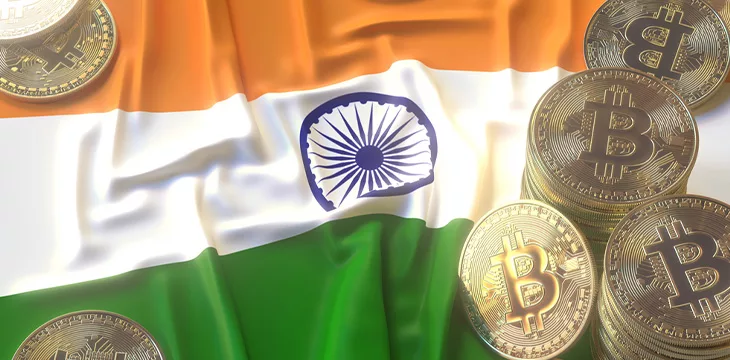|
Getting your Trinity Audio player ready...
|
India’s budget—a financial statement outlining estimated expenditure and government receipts for a particular year—will be presented on February 1, setting the tone for elections later this year. The Web 3.0 industry hopes for a “level playing field” for virtual digital assets (VDAs), clearer regulations, and dedicated funds from the government for indigenous blockchain projects.
In April 2022, India’s finance minister, Nirmala Sitharaman, imposed a 30% flat tax on all digital currency income, and on July 1, she set a 1% tax deducted at source, or TDS, on all VDA trades above 10,000 Indian rupees (US$120). The South Asian nation also does not allow VDA traders to offset losses with gains made elsewhere. In 2023, India introduced a penalty equal to TDS for non-deduction, interest of 15% annually for late payment, and even a jail term of up to six months.
“What we are expecting is rationalization of the TDS. All we are asking for is a level playing field where there is no tax arbitrage or regulatory arbitrage,” Rajagopal Menon, vice president of WazirX, one of India’s largest virtual digital asset trading platforms, told CoinGeek in an exclusive interview.
“Ever since the imposition of this 1% TDS, volumes in Indian exchanges have collapsed and all the volumes and traders have migrated to foreign exchanges. All we’re asking for is the TDS to be brought down to 0.01% because if the objective is to track digital asset transactions, any amount of TDS is ok,” Menon added.
The second request is the reduction of the 30% flat tax and allowing losses to be offset with profits. Menon said he expects the government to be “more pragmatic and practical” and ensure that setting off losses is allowed in virtual digital asset trading, just as in securities trading in India.
“The government is taking baby steps towards regulation. All G20 countries are expected to have crypto regulations in place by 2025. So while we are asking for all these tweaks to be done, I think the government is busy making this roadmap happen, getting a consensus from all G20 countries,” Menon added.
India assumed the Group of 20 (G20) Presidency in December 2022 for one year, with digital asset regulation as one of its agendas. The G20 is an intergovernmental forum of the world’s major developed and developing economies, collectively accounting for 85% of global gross domestic product (GDP) and 75% of international trade.
“As India embraces the transformative potential of the Web3 industry, we anticipate that Union Budget 2024 will lay the foundation for a robust and inclusive digital economy that will ensure the benefits of such innovative technology reaches out to every corner of the country,” said Nischal Shetty, co-founder of Shardeum, an EVM-based, linearly scalable smart contract platform.
“Web3 and blockchain can solve many of India’s challenges in sectors such as payments, education, and healthcare. As industry players, we would request our finance minister to announce incentives and benefits for entrepreneurs and startups who are working on such progressive technologies,” Shetty told CoinGeek. “The industry would also like the ministry to consider rolling out specific domestic regulations for India for greater stability and dedicate funds for indigenous blockchain projects, exemplifying real-world utility and innovation.”
Challenging period
The Indian digital currency industry has demonstrated resilience amid a challenging period marked by market downturns and regulatory ambiguities, showcasing India as a significant market for virtual digital assets (VDAs) with widespread grassroots adoption.
“Trading volumes have experienced a major dip, with a significant portion moving to offshore exchanges, creating a competitive struggle for domestic platforms,” pointed out Sumit Gupta, co-founder of CoinDCX, India’s first digital currency unicorn.
India is likely to witness a loss of about $1.2 trillion in trade volume on domestic exchanges over the coming years, a study from Esya Centre, an Indian policy think tank, claimed. The study also pointed out that due to the imposition of harsh tax measures in February 2022, as much as $3.85 billion had moved to overseas digital asset trading exchanges as traders looked to evade punishing taxes in India.
“India, being an attractive market for global players, has seen increased focus, given its young demographic and widespread access to technology. While this presents growth opportunities, challenges arise due to the lack of clarity and a standardized regulatory framework,” Gupta of CoinDCX said.
“Denial of payment rails from banks and payment service providers (UPI, cards and netbanking), is akin to a shadow ban, and has had a substantial detrimental impact on the volume, revenue, and user experience of Indian individuals seeking to access domestic virtual digital asset platforms,” Gupta added.
“India showed commendable leadership at the G20 to arrive at a roadmap for a global crypto framework and has implemented domestic regulatory frameworks such as anti-money laundering that are in line with the global standards,” Ashish Singhal, co-founder and group CEO of PeepalCo.
Singhal said this could be the basis for India to reconsider its tax treatment of virtual digital assets, which is an outlier, both domestically and internationally.
“Reducing the tax arbitrage that exists today will also help stem the flight of capital, consumers, investments, and talent, as well as dent the gray economy for VDAs,” Singhal added.
Additionally, there should be some kind of licensing system for service providers that will be parallel to how Dubai and other countries operate that have given proper regulation and licensing guidelines for virtual asset service providers, pointed out Rohan Sharan, founder and CEO of Timechain Labs, an on-chain application development firm that’s utilizing BSV Blockchain technology.
Watch: Blockchain ticks all the boxes for India’s thriving e-commerce market

 02-14-2026
02-14-2026 




